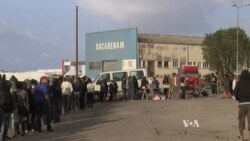As the sun set over the French port of Calais, foreigners poured into a dusty lot, transforming it into a makeshift soup kitchen. Volunteers handed out plates of pasta, bread and fresh fruit to groups of men and a few women.
Many have made long, sometimes perilous journeys from Africa and the Middle East to reach this northern seaside town. Their final destination is not Calais, however, but the country just across the English Channel.
"I pray to God to be in England. And I have tried too much to enter the UK," said Mohammed, a 35-year-old English teacher from Syria. "England is better for me, because of the language, for my life."
Calais has long attracted immigrants fleeing poverty or conflict, most of them hoping to cross the 20-mile channel to Britain, where they believe better treatment and greater opportunities await. But London is cracking down on illegal immigration, meaning that for hundreds of migrants, options for moving on from Calais are closing.
The deaths of hundreds of migrants in the Mediterranean this week has again spotlighted the perils of reaching Europe. Those fortunate enough to reach a place like Calais — where camps have little sanitation, no electricity, and food is scarce — find that their problems aren't over.
For the roughly 1,500 foreigners stuck in France but dreaming of Britain, it means using brazen and sometimes violent tactics. Anything to climb aboard a boat or a truck headed north.
In recent weeks, the camps have become a flashpoint for police crackdowns. According to British media, French authorities used tear gas and truncheons to keep rioting migrants from boarding British-bound trucks.
The confrontations are nothing new. Riot police began clearing hundreds of immigrants from these makeshift camps in late May after local officials said an outbreak of scabies had made camps a danger to public health. The evictions came just days after anti-immigration parties topped European elections in both France and Britain.
The victorious French National Front party leader Marine Le Pen raised the issue on the campaign trail, calling for France to exit Europe’s passport-free area known as the Schengen zone.
Now, the tug-of-war over French immigration policy is escalating.
"All Europe ... and mainly our English friends, are blaming the city of Calais," Deputy Mayor Philippe Mignonet said. "Where the mayor of Calais tries to rebuild the city, bring in new investors, new companies, new industries, all the work she does is destroyed because of what is happening."
Trucking companies are ringing their parking lots with barbed wire, and local police are stepping up their watch as migrants and anti-immigrant activists stage rival demonstrations.
Mayor Natacha Bouchart has threatened to shut down Calais port to protest Britain's perceived lack of support. Mignonet has suggested that London's offer to send in fences from its NATO meeting this month is a bad joke.
"England is saying it is a French problem, and some French are saying it is an English problem. I would go further than that. It is a European problem, at least. And I prefer to say it is a worldwide problem," Mignonet said. "We know we can build walls or put fences everywhere around the country, around Europe, around the United States. That will not avoid the people to come. They are still leaving their countries."
Mohammed, who left Syria a month ago, crossing the border into Turkey before heading on to Italy, paid $1,600 to middlemen to travel to this squalid seaside tent camp.
"Because I run away from the violence, the terrorist, the war," he said. "You do not imagine. I can't continue… I have a woman and a little child, and I pray every day to keep them until I can let them come to me."
While French officials are pushing the migrants to apply for French asylum here, Mignonet said few are interested.
"At the end, the migrants only want to go to England ... they know that once they are in England, they will be able to claim facilities. They will be able to get a bit of money from the English government, even if it is only a small amount," he said. "But that is always far better than the conditions in their own countries."
Anuar, an 18-year-old from Darfur, said he crossed the Mediterranean on a rickety boat from Libya.
"No problem, London. Sleeping and eating. No problem. Calais? Problem," he said. "No eating, no sleeping. No school."
The debate is part of an ongoing cycle, said Christian Salome, who runs a charity called Auberge des Immigrants. More than a decade ago, French authorities shut down an overburdened asylum center called Sangatte, hoping that would slow the influx.
"And now the refugees are on the street," she said. "They have nothing and a lot of them have no money at all to eat, so we give them food."
VOA correspondent Henry Ridgwell contributed to this report from London.





